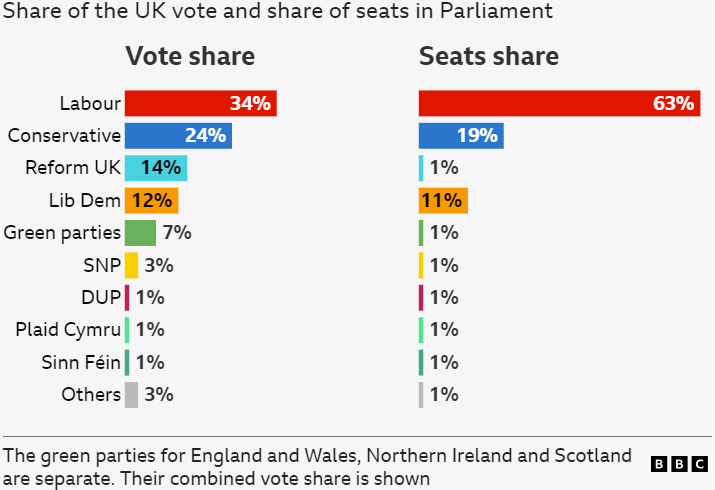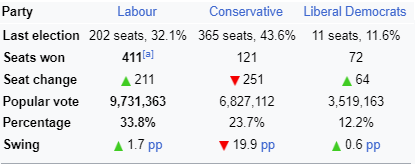France moved both left and [far-]right. What shrunk was the center[-right].

Also, the NFP is a coalition, inside that France Unbound [which is regarded as more far-left] gained more seats (78) than the 'traditional' Socialists (65). (The Greens, which are also part of NFP got 33. The self-labeled Communists--9.) And yeah, one can probably say that Macron's plan (thus) largely backfired.
It's pretty normal for the ruling party (or parties) to experience vote share erosion at some point. This process is similar in the UK, by the way. The exact party ideologies matter less (IMHO) than said process of erosion, in this particular discussion.
And the UK has also experienced is a 'syphoning' of the votes from the Conservatives by Reform party, which got 14.3% of the popular vote. And in a FPTP system that has had dramatic consequences in terms of seats. (Something that was in fact predicted by some observers even before the vote took place.) While Labour didn't increase their popular vote share much (just 1.7pp compared to the previous election) Conservatives' popular vote share tanked by 19.9pp!
However, unlike in France where RN saw a large increase in seats, in the UK's FPTP system, Reform was among the most disadvantaged, getting only 1% of seats.

So votes for them (Reform) essentially turned into seats for Labour or the Lib Dems, which also experienced a dramatic seat gain (+64) with just 0.6pp increase in their popular vote share.

And for a bit of [comparative] history, unlike in 2019 when Farage's party (of then, the Brexit Party) didn't contest the seats where pro-Brexit Conservatives were running, in late 2023 Farage announced that his (new = Reform) party was going to contest every seat. This was nominally motivated by criticism that Conservatives (incl. Johnson) had "governed as a Green [would]".
Due to party name/focus changes etc., Wikipedia doesn't compare Reform with the results of the Brexit Party, but al-Jazeera does mention that
This is a rise of 12.3 percentage points since the last election, when it was known as the Brexit Party.
And yeah, concurring with the idea of erosion I mentioned:
“In many ways, this looks more like an election the Conservatives have lost than one Labour has won,” wrote John Curtice, professor of politics at the University of Strathclyde, for the BBC.


